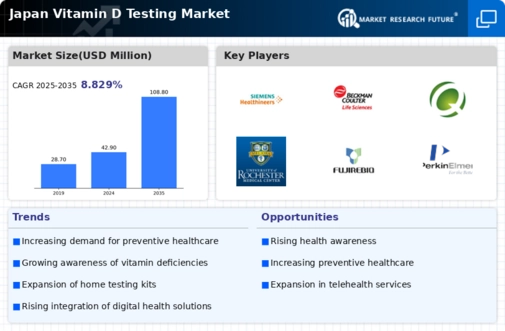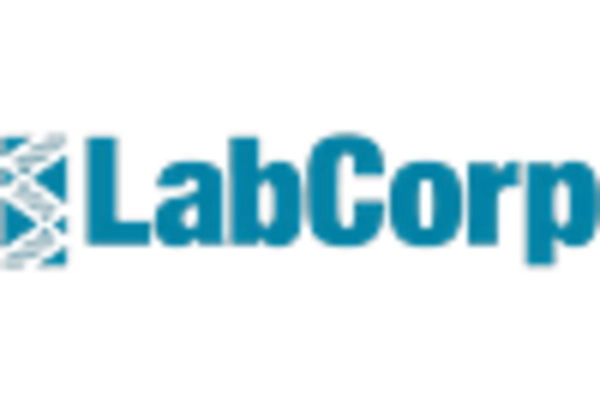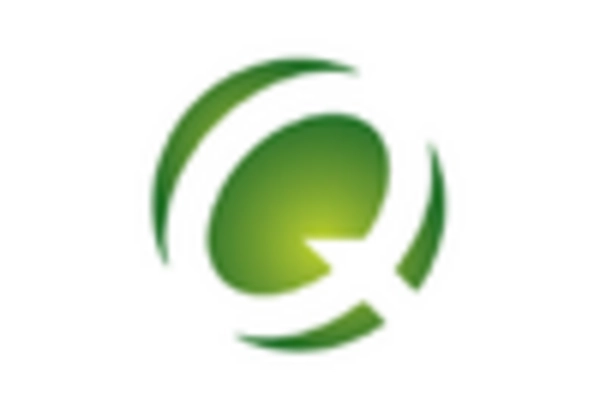Growing Demand for Home Testing Kits
The trend towards home healthcare solutions is reshaping the vitamin d-testing market in Japan. With the increasing availability of home testing kits, consumers are becoming more inclined to monitor their vitamin D levels independently. These kits offer convenience and privacy, appealing to a demographic that prefers self-management of health. Market data suggests that the home testing segment is experiencing rapid growth, with sales projected to increase by over 25% in the coming years. This shift towards home testing not only empowers individuals but also alleviates pressure on healthcare facilities, potentially leading to a broader acceptance of vitamin D testing as a routine health measure.
Rising Interest in Personalized Nutrition
The growing interest in personalized nutrition is driving the vitamin d-testing market as consumers seek tailored health solutions. Individuals are increasingly aware that optimal vitamin D levels can vary based on factors such as age, lifestyle, and genetic predisposition. This awareness has led to a demand for personalized testing services that provide insights into individual vitamin D needs. Nutritionists and health coaches are incorporating vitamin D testing into their services, further promoting its importance. As the trend towards personalized health continues to gain traction, the vitamin d-testing market is likely to benefit from an increase in demand for customized health assessments and recommendations.
Government Initiatives and Health Policies
Government initiatives aimed at improving public health in Japan are significantly influencing the vitamin d-testing market. The Ministry of Health, Labour and Welfare has been promoting awareness campaigns regarding the importance of vitamin D for bone health and immune function. These initiatives often include recommendations for regular testing, particularly for vulnerable populations. As a result, healthcare facilities are increasingly integrating vitamin D testing into routine health check-ups. The financial support for testing programs may also enhance accessibility, thereby driving market growth. With the government's focus on preventive healthcare, the vitamin d-testing market is poised for expansion as more individuals participate in health screenings.
Increased Incidence of Vitamin D Deficiency
The rising incidence of vitamin D deficiency in Japan is a critical driver for the vitamin d-testing market. Studies indicate that approximately 40% of the Japanese population may have insufficient levels of vitamin D, particularly among the elderly and those with limited sun exposure. This growing awareness of deficiency has led to an increased demand for testing services, as individuals seek to monitor their vitamin D levels. Healthcare providers are also emphasizing the importance of regular testing to prevent associated health issues, such as osteoporosis and cardiovascular diseases. Consequently, the vitamin d-testing market is likely to expand as more individuals and healthcare professionals recognize the necessity of monitoring vitamin D levels to maintain overall health.
Integration of Vitamin D Testing in Routine Health Check-ups
The integration of vitamin D testing into routine health check-ups is becoming more prevalent in Japan, significantly impacting the vitamin d-testing market. Healthcare providers are recognizing the importance of assessing vitamin D levels as part of comprehensive health evaluations. This shift is partly driven by the increasing evidence linking vitamin D to various health outcomes, including immune function and chronic disease prevention. As a result, more healthcare facilities are adopting protocols that include vitamin D testing in their standard check-up procedures. This trend not only enhances the visibility of vitamin D testing but also encourages individuals to prioritize their health, thereby contributing to the growth of the market.
















